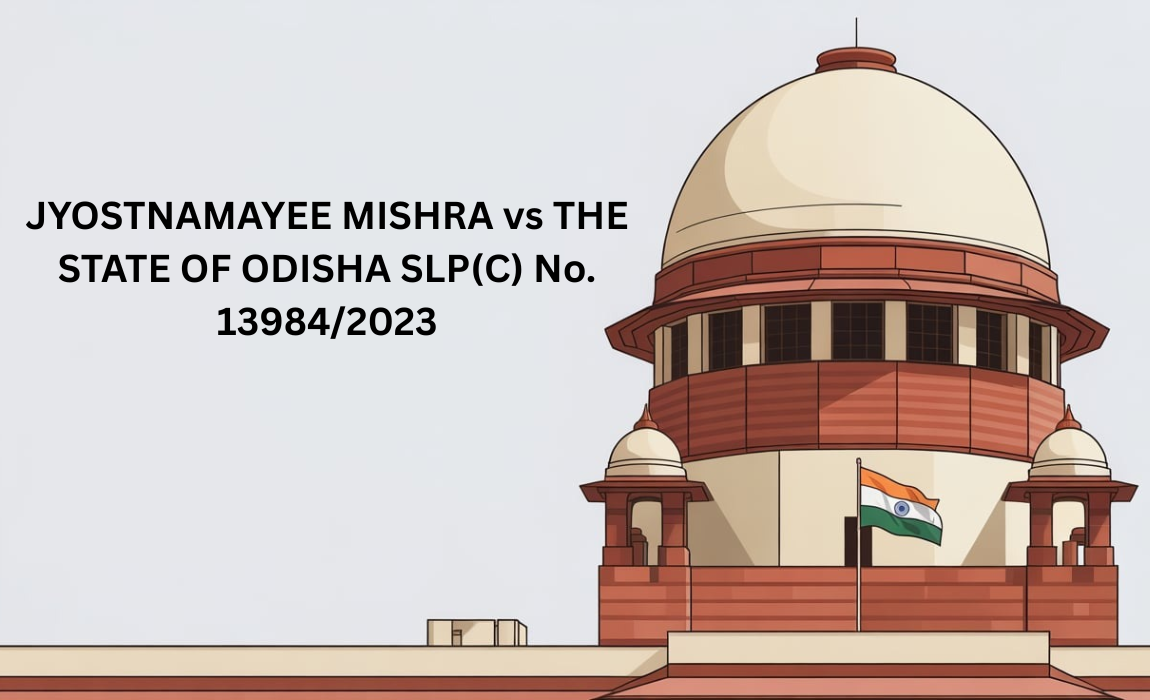
JYOSTNAMAYEE MISHRA vs THE STATE OF ODISHA SLP(C) No. 13984/2023
Sanskriti Verma In a judgment that speaks volumes about the enduring strength of constitutional principles in public employment, the Supreme Court in Jyostnamayee Mishra v. State of Odisha (SLP(C) No. 13984/2023) has delivered a decisive and much-needed reminder: the right to fair treatment in service matters is not a bureaucratic courtesy—it is a constitutional entitlement.
The case concerned Jyostnamayee Mishra, a lower-tier government employee serving as a peon in the State of Odisha. Over the years, she became eligible for promotion to the post of Tracer— a position requiring technical aptitude and service experience. Despite fulfilling all requirements and having no adverse record, her claim to promotion was repeatedly denied.
What made the injustice starker was the fact that her juniors were promoted ahead of her, and no adequate justification was ever offered by the State for the deviation from the principle of seniority-cum-merit.
The Court’s Stand: Merit and Equality Cannot Be Denied
The Supreme Court's ruling rightly placed emphasis on Articles 14 and 16 of the Constitution, which guarantee equality before the law and equal opportunity in matters of public employment. The Court condemned the arbitrary denial of promotion and made it clear that when a government employee fulfills the requisite conditions for promotion, the State cannot act in a discriminatory or opaque manner.
Importantly, the judgment extended beyond the personal grievance of one employee and exposed a pattern often seen in lower-level public employment: the institutional neglect of fair administrative processes, especially when it comes to women and underrepresented workers in the system.
Gender Justice in Public Employment
What distinguishes this judgment is its strong message on gender inclusivity in the workforce. The Court noted that denial of promotion in cases like Mishra’s not only undermines individual merit but also reinforces structural barriers against women in the public sector. In environments where women already face glass ceilings, opaque service decisions tend to disproportionately affect them, even when they have worked diligently within the system.
The ruling sends a strong signal: gender-based indifference in service promotion, even if not explicitly discriminatory, cannot escape constitutional scrutiny.
Administrative Fairness Is Not Optional
A key feature of the Court’s reasoning is the emphasis on procedural fairness. The State of Odisha failed to provide any valid reason for overlooking Mishra’s promotion. The Court reminded authorities that public employment is governed not by discretion, but by rule-based conduct, and that arbitrariness is the antithesis of the rule of law.
In this light, the judgment acts as a check on the unchecked powers of departmental heads, whose decisions, unless challenged, often go unscrutinized and remain undocumented. By insisting on clear reasoning, transparency, and compliance with service rules, the Court has elevated what many consider “routine matters” into questions of constitutional fidelity.
A Broader Message to Bureaucracies
This case is not an isolated aberration—it reflects a systemic malaise affecting thousands of government employees across states. Promotions based on favoritism, delay in updating service records, and misuse of discretionary powers are rampant. The Court’s ruling is thus a reminder to all state governments that fair employment practices are not optional—they are a constitutional mandate.
The decision also reinforces the need for institutional reforms, including digitization of service records, automatic eligibility tracking for promotions, and time-bound grievance redressal in service disputes.
Conclusion: Constitutional Justice for the Last Worker
Jyostnamayee Mishra v. State of Odisha may appear to deal with a single employee, but its jurisprudential echo is much larger. It defends the dignity of work, the importance of gender inclusive progress, and the principle that equality in opportunity must be lived, not just promised.
In a country aspiring to modernize its bureaucracy and deepen its democratic values, the judgment serves as both a legal precedent and a moral compass. It is a tribute to those who serve silently within the system and a warning to administrations that justice, though delayed, cannot be denied when constitutional rights are at stake.
